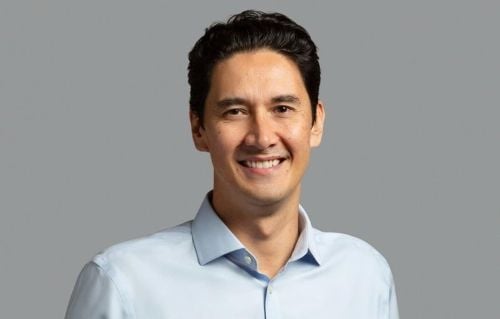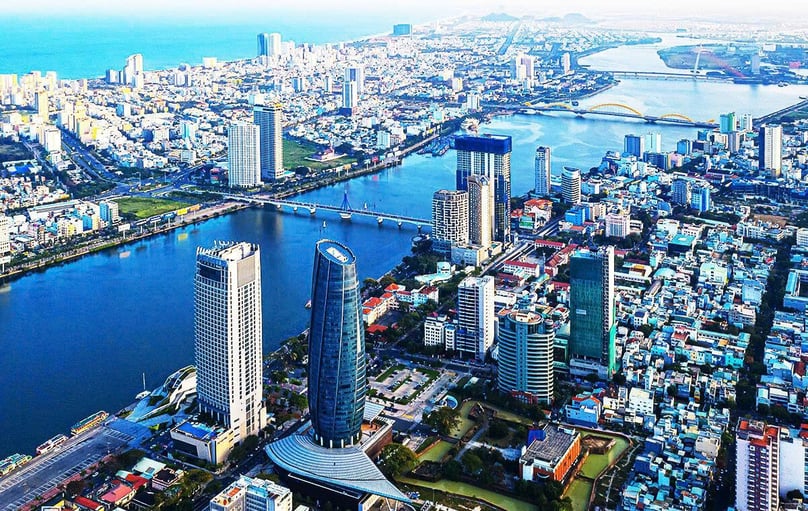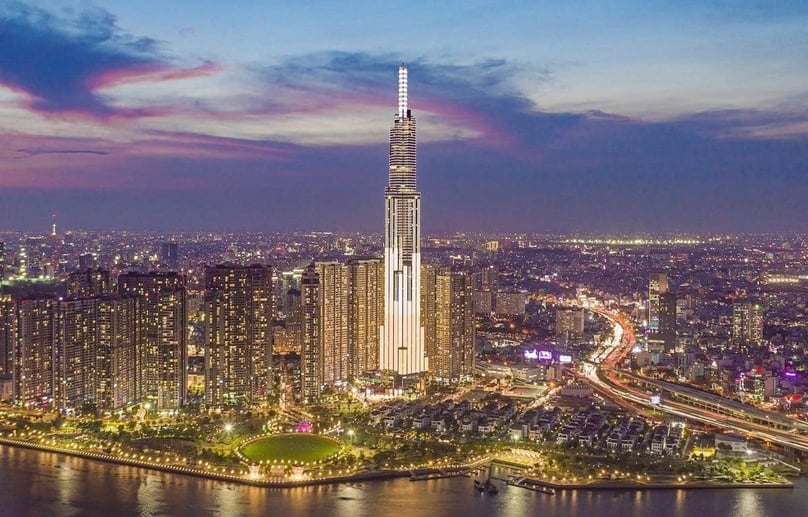World-class talent ‘absolutely central’ to success of Vietnam's international financial center ambition: Tony Blair Institute
Damian Hickey, regional director, South East Asia, Tony Blair Institute talks with The Investor on international investors’ interest in Vietnam’s dual-campus international financial center (IFC) model and suggests ways to attract world-class talent for the country’s IFC ambition.

Damian Hickey, regional director, South East Asia, Tony Blair Institute. Photo courtesy of the institute.
It appears that, for the first time in the world, an International Financial Center (IFC) will be established in two cities within the same country — specifically, in Vietnam. As part of the recent restructuring of the national political system, Danang and Quang Nam have merged to form the new Danang, now the largest centrally-administered city by area. Given these unique circumstances, how do you assess the potential advantages and disadvantages of establishing an IFC? What sectors or types of businesses should be prioritized in each city?
It is not a new idea for a single country to have more than one financial center globally. We see examples like New York and Chicago in the U.S., Dubai and Abu Dhabi in the UAE, Shanghai and Shenzhen in China, or Seoul and Busan in South Korea. However, what makes Vietnam’s case unique is that it is not two separate financial centers. Instead, it’s one unified IFC headquartered in Ho Chi Minh City with a branch in Danang, managed under a single legal, regulatory, and operational framework.
There are clear advantages to this model. First and foremost, it allows Vietnam to capitalize on the complementary strengths of each city. HCMC is already the country’s financial capital with depth in banking, asset management, capital markets, and a broad investor base. This will make the city ideal for traditional finance to be more established with depth and breadth.
On the other hand, Danang is quickly establishing itself as a hub for digital innovation. We’ve seen the city make impressive strides — just earlier this year, it jumped 130 places in the Global Startup Ecosystem Index by StartupBlink, which really speaks to the growing appeal of Danang for global tech firms and start-ups alike. This momentum gives the city a strong foundation to focus on emerging sectors like fintech, digital assets, and ESG finance.
What’s also exciting is Danang’s strategic position in central Vietnam. It already has a well-developed logistics network, and with the recent approval of a Free Trade Zone, the city is very well-placed to lead in trade-related financial services. With the merger of Quang Nam, there’s even more potential when we take into account the expanded industrial land and access to Chu Lai Economic Zone. That gives Danang the space to build dedicated financial districts that are located alongside industrial and logistics hubs, creating a natural ecosystem for trade finance, supply chain finance, and export-focused financial services.

A corner of Danang city, central Vietnam. Photo courtesy of Danang Police.
In addition, with Vietnam’s recent plans to expedite its green transition and high-tech investments, and the global push for green finance, Vietnam could use the IFC as a testbed for new green loans and sustainability linked financing initiatives.
Another benefit of setting up the dual-campus model is to help avoid duplicating effort and resources. You don’t need two sets of laws, regulators, or branding strategies. That unified structure makes it more cost-effective, and investor-friendly. When international investors look at Vietnam’s IFC, they should see one rulebook, one authority, one brand, regardless of whether they’re in HCMC or Danang.
That said, there are challenges that we’ve advised the government to prepare for. One is governance complexity. The IFC leadership need to make sure that there are clarity and full alignment between the central level and two localities, and that both localities speak the same voice, in order to avoid delays or overlaps of efforts. There’s also a risk of internal competition if the two cities don’t clearly differentiate their sectoral focus and approaches. Finally, legal clarity is key. This means the IFC management authority should ensure a strong, unified law and dispute resolution framework to avoid confusion or operational slowdowns.
It has been said that the recently approved National Assembly resolution on the IFC includes groundbreaking incentives compared to other international financial centers worldwide. What is your take on this? Are there any additional incentives that you believe should be considered?
The recent IFC resolution has tremendous potential as it combines institutional autonomy, simplified legal procedures, improved market access, and operational familiarity for international investors — all under a unified legal framework. The resolution reflects strong political will from the top levels of government to build a fair, transparent, and globally competitive business environment. For any investor considering Vietnam, that sends a very powerful signal.
That said, the real question now is, how will these policies be brought to life? The success of this IFC doesn’t rely solely in writing but it also depends on how well it’s implemented in practice. That means efficient execution at both campuses — HCMC and Danang — and ensuring that the operational systems and regulatory processes actually deliver the benefits promised. From the outset, TBI has been closely involved in supporting the Vietnamese government in formulating the IFC strategy, including advising on institutional design, identifying focus sectors, and shaping the enabling legal framework for the financial ecosystem development. Now that the resolution is passed, TBI remains committed to supporting the policy implementation and delivery.
If Vietnam is to consider additional incentives, they should be strategic and tightly aligned with the unique value propositions of each campus. Tailored incentives that aim to directly support the right audience will likely have the most impact.
However, incentives alone aren’t enough to make an IFC successful. Their effectiveness is closely tied to the broader enabling environment, which encompasses factors such as robust digital and physical infrastructure, transparent and responsive governance, access to skilled talent, and macroeconomic stability. If those elements fall short, even the best incentives will struggle to deliver.
We’ve seen other IFCs take a similar approach. Take Singapore, for example — they’ve established the Financial Sector Development Fund to provide grants for asset management, capital markets, and fintech innovation. Their Financial Sector Technology and Innovation Scheme (FSTI) 3.0 scheme goes even further, encouraging adoption of emerging financial technologies like AI, quantum computing, and ESG-focused fintech. In addition, through their Green Finance Action Plan, they’ve integrated sustainability into finance via dedicated grant programs and blended finance tools. That level of targeted support, combined with world-class infrastructure and talent, is how the Singaporean IFC can really differentiate itself from others.
In your line of work, you have likely met with a number of potential investors who are exploring opportunities within Vietnam’s IFC. Could you describe their level of interest as well as any concerns they may have expressed?
TBI has been engaging with a range of investors across different sectors — from global banks, fintech and technology firms to fund managers, and infrastructure investors. Overall, the level of interest in Vietnam’s IFC is strong, but still emerging. Many see Vietnam as one of the most dynamic economies in the region, with a fast-growing economy, and a strong ongoing national-level administrative reform. The IFC initiative further demonstrates the country’s strong commitment to moving up the value chain, positioning itself not only as a leading manufacturing base, but also as an emerging regional hub for finance and innovation.
That said, the IFC is still at an early stage, and many investors, particularly those outside of Asia, are not yet fully aware of the Vietnam IFC plans and what it means for global investors. Even some regional firms are only starting to hear about it. While the concept has been recognized in policy circles and some investment networks, the broader investor community needs more exposure. This is where branding and strategic communication really matter. Vietnam needs a global, well-targeted branding and outreach campaign to clearly communicate its value proposition and competitive advantages, as well as the reforms and incentives the governments are undertaking to make Vietnam appeal to global investors.
The fact that some investors are taking a cautious, wait-and-see approach really comes down to a few key factors:
First is execution. As mentioned above, there’s always skepticism about whether bold plans on paper can be delivered — especially in a consistent and coordinated way. For example, investors want to see whether the Vietnam IFC Authority — once established — will have real autonomy, a clear mandate, and the power actually to implement the policies in the resolution without red tape.

A corner of Ho Chi Minh City, southern Vietnam. Photo courtesy of Vietnam News Agency.
Second, clarity and consistency. Investors want to know: will the legal framework be predictable, consistent across both cities, and implemented seamlessly between central and local levels? At the same time, they are also interested in the spill-over effect to the rest of the economy, and the long-term prospect of mainstreaming certain policies that make Vietnam a more investor-friendly environment.
Third, convertibility and capital mobility is another important factor. If you’re running a fund or managing global capital, you need to be able to move money in and out — freely, and without surprises. Vietnam is rightly taking a cautious approach to liberalizing its FX regime, repatriation processes, and the depth of hedging instruments available. This will be a long-term process that need to be approached by phase. However, it is important that the IFC Authority sends a clear message about the steps Vietnam is taking to gradually integrate while managing risks.
Building a successful IFC in Vietnam will undoubtedly require global talent. Do you believe that the incentives outlined in the Resolution, such as visa facilitation, personal income tax benefits, and work permit exemptions are sufficient to attract top-tier international professionals?
That’s a really important question because you can’t build a world-class financial center without world-class talent. It’s not just about money or buildings, it’s about people. The kind of professionals who bring deep technical expertise, global experience, credibility, and networks. So attracting those individuals is absolutely central to whether Vietnam’s IFC will succeed.
Now, the incentives in the Resolution, like easier visa processing, reduced personal income tax, and work permit exemptions, are steps in the right direction.
That said, if we look at some of the most successful IFCs like Singapore, Dubai’s DIFC, or Abu Dhabi’s ADGM, what really sets them apart is the full ecosystem they’ve created to support international professionals and their families. It’s not just about tax and visa. It’s things like:
• Clear tax residency status and legal structures to protect personal and corporate wealth.
• Top-tier international schools, healthcare, and recreational services — because let’s face it, people move with families, not just jobs.
• And even things like relocation support and concierge-style “soft landing” services that help new arrivals get set up quickly and smoothly.
And one idea we think could work is a Global Talent One-Stop Portal. A single platform where professionals can handle immigration, work permits, tax guidance, and relocation services, all in one place, in English, fast-tracked. That would send a strong message that Vietnam is open, ready, and serious about welcoming global talent.
- Read More
SJ Group to build smart urban area in western Hanoi to bolster Hoa Lac High-tech Park
Vietnam's leading developer SJ Group JSC is outlining plans for its over 1,200-hectare Tien Xuan Smart Urban Area project in Hanoi, which is expected to be a residential and service hub of the Hoa Lac science and technology city.
Real Estate - Sat, December 20, 2025 | 10:36 am GMT+7
Indonesia to deepen role in global semiconductor supply chain
Indonesia is rolling out efforts to identify opportunities and map its natural resources to support the semiconductor industry, as part of a broader strategy to build domestic industrial capacity.
Southeast Asia - Sat, December 20, 2025 | 9:36 am GMT+7
Indonesia to stop rice imports next year
Indonesia will not import rice for either consumption or industrial use next year, citing sufficient domestic production, according to a government official.
Southeast Asia - Sat, December 20, 2025 | 8:00 am GMT+7
Northern Vietnam port city Hai Phong charts sustainable growth path for free trade zone
The establishment of Hai Phong Free Trade Zone (FTZ) is a strategic direction that will elevate the role and position of Vietnam in general and Hai Phong in particular within the global value chain, heard a conference held in the northern port city last week.
Economy - Fri, December 19, 2025 | 8:12 pm GMT+7
Construction begins on $32.5 bln Red River Scenic Boulevard project in Hanoi
The gigantic project Red River Scenic Boulevard, with a preliminary investment of about VND855 trillion ($32.49 billion) in Phu Thuong ward, Hanoi, broke ground on Friday.
Real Estate - Fri, December 19, 2025 | 4:57 pm GMT+7
Major Vietnamese groups kick off mega projects in south-central Vietnam
Vingroup, BIN Corporation, Hoa Phat, and FPT simultaneously broke ground on large-scale projects in south-central Vietnam on Friday, raising expectations for new national growth momentum in the coming period.
Economy - Fri, December 19, 2025 | 4:36 pm GMT+7
Mega-airport Long Thanh in southern Vietnam welcomes first passenger flights
The first passenger flights touched down at Long Thanh International Airport in Dong Nai province on Friday morning, marking the inaugural civil aviation operation at Vietnam’s largest airport.
Economy - Fri, December 19, 2025 | 2:07 pm GMT+7
Vingroup starts work on $35.2 bln Olympic Sports Urban Area on Hanoi outskirts
Vingroup (HoSE: VIC), Vietnam's leading private conglomerate, on Friday broke ground on its 9,171-hectare Olympic Sports Urban Area project in Hanoi, which is expected to become a new growth engine for the southern part of the capital in the next decade.
Real Estate - Fri, December 19, 2025 | 1:59 pm GMT+7
Vietnam telecom giant VNPT establishes AI company
State-owned Vietnam Posts and Telecommunications Group (VNPT) on Thursday launched subsidiary VNPT AI, aiming to bring Vietnamese AI products to international markets.
Companies - Fri, December 19, 2025 | 11:50 am GMT+7
Quang Ngai Sugar develops sugar, biomass power projects worth $179 mln in central Vietnam
Quang Ngai Sugar JSC (UPCom: QNS), a top sugar producer in Vietnam, will simultaneously hold groundbreaking or inauguration ceremonies on Friday for three projects worth over VND4.7 trillion ($178.5 million) in Gia Lai province.
Companies - Fri, December 19, 2025 | 8:05 am GMT+7
Vietnam defeat Thailand to win men’s football gold at SEA Games 33
After conceding two goals in just over 30 minutes, Vietnam reversed the situation to finally beat host nation Thailand 3-2 in the men’s football final of the 33rd SEA Games.
Travel - Thu, December 18, 2025 | 10:43 pm GMT+7
Sun Group to commence construction on 5 landmark projects worth $5.7 bln
Sun Group is scheduled to start construction of five large-scale projects across Vietnam’s three regions on Friday, with a total investment of nearly $5.7 billion.
Companies - Thu, December 18, 2025 | 8:39 pm GMT+7
Unpaid credit card balances in Singapore hit record high in 10 years
Singapore's credit card debt has exceeded SGD9.07 billion (about $7 billion) in 2025's third quarter, a 10-year high that was last seen in 2014.
Southeast Asia - Thu, December 18, 2025 | 7:54 pm GMT+7
Thailand, Japan deepen transport, infrastructure cooperation
Thai Deputy Prime Minister and Minister of Transport Phiphat Ratchakitprakarn has met with Japanese Ambassador Otaka Masato to advance cooperation in Thailand’s transportation and infrastructure projects.
Southeast Asia - Thu, December 18, 2025 | 7:50 pm GMT+7
Masan's FMCG arm MCH to list on HCMC bourse at $8 per share, valuation tops $8.6 bln
Masan Consumer Corporation (UpCoM: MCH), the fast-moving consumer goods arm of Vietnam’s Masan Group, will officially debut on the Ho Chi Minh City Stock Exchange (HoSE) on December 25, with a reference price set at VND212,800 ($8.08) per share.
Companies - Thu, December 18, 2025 | 4:57 pm GMT+7
Sun Group-led consortium to build $616 mln Red River bridge in Hanoi
Hanoi authorities have approved a consortium led by Sun Group as the investor for the Tran Hung Dao bridge project, with a total investment estimated at VND16.27 trillion ($616.14 million).
Infrastructure - Thu, December 18, 2025 | 3:26 pm GMT+7
- Consulting
-
Vietnam M&A 2025: Opportunities reshaped by disciplined capital
-
VN-Index rises 3.1% in Nov, Finnish fund PYN Elite records -5.8%
-
Mind the gap
-
The generation game: Adapting to an aging population
-
Decentralization and the potential for multi-center urban development in HCMC’s satellite areas
-
Powering growth from within
























